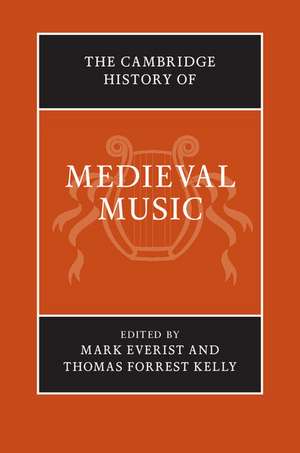The Cambridge History of Medieval Music 2 Volume Hardback Set: The Cambridge History of Music
Editat de Mark Everist, Thomas Forrest Kellyen Limba Engleză Quantity pack – 8 aug 2018
Preț: 1572.41 lei
Preț vechi: 2042.08 lei
-23% Nou
Puncte Express: 2359
Preț estimativ în valută:
300.87€ • 314.17$ • 248.45£
300.87€ • 314.17$ • 248.45£
Carte disponibilă
Livrare economică 26 martie-09 aprilie
Preluare comenzi: 021 569.72.76
Specificații
ISBN-13: 9780521513487
ISBN-10: 0521513480
Pagini: 1226
Ilustrații: 54 b/w illus. 276 music examples
Dimensiuni: 187 x 253 x 110 mm
Greutate: 2.57 kg
Editura: Cambridge University Press
Colecția Cambridge University Press
Seria The Cambridge History of Music
Locul publicării:Cambridge, United Kingdom
ISBN-10: 0521513480
Pagini: 1226
Ilustrații: 54 b/w illus. 276 music examples
Dimensiuni: 187 x 253 x 110 mm
Greutate: 2.57 kg
Editura: Cambridge University Press
Colecția Cambridge University Press
Seria The Cambridge History of Music
Locul publicării:Cambridge, United Kingdom
Cuprins
Volume 1: 1. Musical legacies from the ancient world Peter Jeffery; 2. Origins and transmission of Franco-Roman chant Andreas Pfisterer; 3. Sources of Romano-Frankish liturgy and music Joseph Dyer; 4. Regional liturgies: Spanish, Beneventan, Gallican, Milanese Terence Bailey; 5. Nova cantica Jeremy Llewellyn; 6. Music and prosopography Margot Fassler; 7. The silence of medieval singers Benjamin Bagby and Katarina Livljanic; 8. Notation I Thomas Kelly; 9. Tropes Andreas Haug; 10. Sequence Lori Kruckenburg; 11. Music theory Thomas Christensen; 12. Vernacular song: lyric Elizabeth Aubrey; 13. Vernacular song: romance Anne Ibos-Augé; 14. Instruments and their music Nigel Wilkins; 15. Teaching and learning music Anna-Maria Busse Berger; 16. Music in drama David Klausner; 17. The sources Stanley Boorman; 18. The revival of medieval music John Haines; 19. Medieval performance practice Timothy McGee; 20. Issues in the modern performance of medieval music John Potter; Volume 2: 21. Institutions and foundations Alejandro Planchart; 22. Notation II Lawrence Earp; 23. Rhythm and metre John Caldwell; 24. Tonal organisation in polyphony, 1150–1400 Peter Lefferts; 25. Liturgy and plainchant, 1150–1570 Peter Lefferts and Roman Hankeln; 26. Early polyphony James Grier; 27. Notre Dame Edward Roesner; 28. Liturgical polyphony after 1300 Karl Kügle; 29. The emergence of polyphonic song Mark Everist; 30. Vernacular song: polyphony Elizabeth Eva Leach; 31. The thirteenth-century motet Rebecca Baltzer; 32. The fourteenth-century motet Alice Clark; 33. Latin song I: songs and songbooks from the ninth to the thirteenth century Helen Deeming; 34. Latin song II: the music and texts of the conductus Thomas Payne; 35. Trecento I: secular music Michael Cuthbert; 36. Trecento II: sacred music and motets in Italy and the East from 1300 until the end of the schism Michael Cuthbert; 37. Ars subtilior Anne Stone; 38. Citational practice in the later Middle Ages Yolanda Plumley; 39. 'Medieval music' or 'early European music'? Reinhard Strohm.
Recenzii
'Not only is [CHMM] an impressive enterprise, and one that will soon find its space in the scholarship, but it also shows the complexity of dealing with a subject matter that underwent profound transformations in the past thirty years … The depth and comprehensiveness of the essays is remarkable … a considerable achievement.' Giovanni Varelli, Medium Ævum
'In two volumes containing thirty-nine essays, The Cambridge History of Medieval Music addresses central concerns: theoretical systems, the work concept, genre, practice, analysis, interpretation, performance, style, intertextuality, influences, sources, editions, dissemination, pedagogy, genre, people, institutions, and cultures … these essays articulate diverse practices and perspectives and offer bibliographies, figures, examples, summaries, historiographies, methodologies, and questions for understanding this long and complex period.' Jennifer Thomas, Renaissance Quarterly
'In two volumes containing thirty-nine essays, The Cambridge History of Medieval Music addresses central concerns: theoretical systems, the work concept, genre, practice, analysis, interpretation, performance, style, intertextuality, influences, sources, editions, dissemination, pedagogy, genre, people, institutions, and cultures … these essays articulate diverse practices and perspectives and offer bibliographies, figures, examples, summaries, historiographies, methodologies, and questions for understanding this long and complex period.' Jennifer Thomas, Renaissance Quarterly
Descriere
This book charts the origins, development and spread of medieval Western European music from late antiquity to the end of the fourteenth century.











